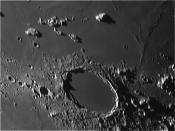Author's introductionary remark:
Still innocent and so naive, the common human consciousness slowly began to raise itself, giving birth thereat to great men, who will forever remain in the hearts of the "consecrated". One of those great men was Plato.
Plato as a philosopher. Plato as an artist. Plato as the birth of concsiousness of its own limitedness. Plato as my own flight from reality.
Being young and inexperienced, and having read one small but important part of Plato's great treasury of dialogues, I stood lost and confused. It is impossible for a philosopher to believe in the existence of two simultaneous worlds. But that is what his words are saying to me. Did he truly believe that our souls had existed in that perfect world, prior to their birth? Being certain that Plato did not think so, and having realized the boundaries of my understanding, I've consulted people who dedicated their lives to this great philosopher.
I must admit that it was just then that my confusion reached its utmost point. I have never seen so many confronted opinions on the same topic. Well, we have the dialogues right in front of us, what is the thing that's keeping us from realizing Plato's thought as it is, and at least reduce the number of confrontations? I know what my obstacle is: youth, lack of experience, lack of knowledge, but what is theirs?
Conclusion: The young common human consciousness created a genius, but a young one, such as itself. Youth as such carries with it the impossibility of valid thought-word transmission. The space is too big. In time, the young common consciousness perfects itself. Its improvement implies the improvement of individual consciousness. The possibility to validly transmit thought-word is greater, therefore the interspace is reduced, and the...


